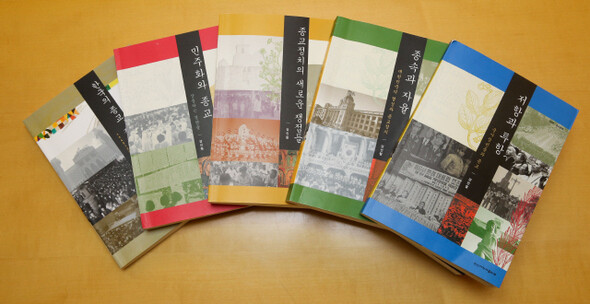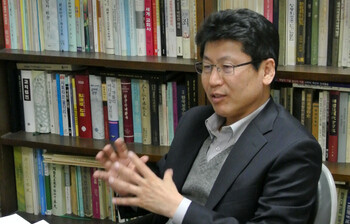hankyoreh
Links to other country sites 다른 나라 사이트 링크
Telling the story of Korea’s religions and politics in 5 books

By Ahn Seon-hee, staff reporter
How was Christmas designated as a national holiday in 1949 when Christians only accounted for 1% of South Korea’s population? Why do politicians turn weak in the face of ‘Yeongnam Buddhists’ and ‘Gangnam Christians’?
Like most areas of society, religion is not free from political ties. In a recently published series of books, research on the relations between religion and politics after Korean independence in 1945 until 2012 is presented like a large mural. Korea’s Religion and Politics, written by Kang In-chul, 54, professor of religion at Hanshin University, is a 5 part series with its first book released on December 2012.

In an April 15 interview with the Hankyoreh, Kang said, “It has been a 15 year goal for me to write a history of Korean religion from a consistent perspective. If I was asked to do it again, I couldn’t”. It took him a total of five years to finish the series. The first volume was published in 2008 and the fifth volume was finished being written in Nov. 2012. During this period, Kang said he isolated himself. He refused to answer phone calls (he doesn’t own a cell phone), only used e-mail when needing to contact someone, and packed his own lunch to eat in the research lab. He even occasionally turned off one of the lights in his lab to make it look empty.
The 5 volume series is over 3,000 pages long. In order to overcome the shortcomings of previous research on the relationship between religion and politics, which mainly centered on Christianity during the time of military rule, the time period of research was broadened to modern history and the range of religion was expanded to Protestantism, Catholicism, Buddhism, Confucianism, Cheondoism etc.
Volume 1 Nation: 1945 to 2012, introduces the theoretical approach and themes of his research acting as an outline. V. 2 Subordination and Autonomy: the formation of Republic of Korea and religious politics, V. 3 Resistance and Surrender: Military regime and Religion, V. 4 Democratization and Religion: the tendencies of contradiction, are all books that explain religion in the period of 1945 liberation to 1961 May coup d’etat, Park Chung-hee regime to the June Struggle, and after the June Struggle to the Lee Myung-bak regime. V. 5 New issues in Religious Politics handles issues that arose after 1987 such as development and religion, foreign mission work, and military service refusal.
Kang pointed out the characteristic of the era of the US military government and Rhee Syngman regime as ‘Protestantism’s leap to a privileged religion‘. Commander at Headquarters of the Allied Powers, Douglas MacArthur and then President Rhee Syngman were devout followers of Protestantism which caused them to give special treatment and privileges to Protestantism. Actions that may only be possible in a Christian nation were taken such as, Christmas being designated as a holiday and military religion system being introduced. He also said, “During the disposal of the property left behind by the Japanese, Protestantism gained the most. The acquisition of the enemy property during this period later became the physical and economical foundation of Korean Protestantism”.
The 26 years of the Park Chung-hee and Chun Doo-hwan regimes was mostly a ‘time of Buddhism’. As the power of Confucianism, Cheondoism and Daejonggyo weakened, Protestantism, Catholicism and Buddhism’s oligarchic system was settled. In order to stably administrate these new systems, the military regime gave privileges to Buddhists by allowing them to charge admission to cultural sites. An interesting passage in his book shows that during this period, the reason why anti-dictatorship movements were led only by Christians is because the they were being supported by American missionaries and churches.
Having affected the democratization of Korea, what role does religion hold following democratization? Kang said, “After democratization, the political role of religion should decrease, but a new form of religious politics is arising in Korea”.
At the end of the 1980s, the topography of Korean religion was reorganized into the three major groups. As of the end of 2005 98.1% of the religious population (52% of the total population) belonged to the three major religions. Democratization signifies the vitalization of electoral politics. The combination of these two phenomena results in “an increase in the political value of major religions”. The ‘Yeongnam Buddhists’ and ‘Gangnam Christians’ are significant examples of such phenomena. Kang said, “Although organization was low among the Buddhist laity but the congregation in Yeongnam is strong, thus it is hard for any political powers to disregard them. In Gangnam and its surrounding areas, there are many Catholics and Protestants, making them forces to be reckoned with by conservative politicians”.
The most distinguished religious political phenomenon in the 2000s was the conservative turn to Protestantism. The Christian Council of Korea is a representative body. Following Rhee Syngman and Kim Young-sam, former president Lee Myung-bak is the third ‘Church Elder President’. The ‘political behaviorism’ of the members of this council starting in the 2000s contributed to his election, Kang said.
Kang pointed out that the expansion Protestants‘ political influence in is poisonous to the religion itself. He said, “Minimal conditions such as, ’moral authority‘ and ’communication capability‘ must be met to gain public sympathy and support when a religion engages in politics. If a certain religion has a large influence but low public confidence, their continuous political action and comments may cause increased opposition from the public. Hereditary in churches, church trading, and refusal of paying income taxes have caused the conservative Protestantism to lose public confidence. As a result of these actions, after 1995, the number of Protestants decreased and the trend became steeper, Kang predicted.
Professor Kang is already focused on his next research topic. "‘Anti-communism and nationalism’, ‘Democracy and republicanism’ are examples of civil religion which broadly and continuously integrate society and the nation. The cultural foundation of these religions is the focus of my next research project".
Translated by Kim Kyung-min, Hankyoreh English intern
Please direct questions or comments to [english@hani.co.kr]

Editorial・opinion
![[Editorial] Intensifying US-China rivalry means Seoul must address uncertainty with Beijing sooner than later [Editorial] Intensifying US-China rivalry means Seoul must address uncertainty with Beijing sooner than later](https://flexible.img.hani.co.kr/flexible/normal/500/300/imgdb/original/2024/0517/8117159322045222.jpg) [Editorial] Intensifying US-China rivalry means Seoul must address uncertainty with Beijing sooner than later
[Editorial] Intensifying US-China rivalry means Seoul must address uncertainty with Beijing sooner than later![[Column] When ‘fairness’ means hate and violence [Column] When ‘fairness’ means hate and violence](https://flexible.img.hani.co.kr/flexible/normal/500/300/imgdb/original/2024/0516/7417158465908824.jpg) [Column] When ‘fairness’ means hate and violence
[Column] When ‘fairness’ means hate and violence- [Editorial] Yoon must stop abusing authority to shield himself from investigation
- [Column] US troop withdrawal from Korea could be the Acheson Line all over
- [Column] How to win back readers who’ve turned to YouTube for news
- [Column] Welcome to the president’s pity party
- [Editorial] Korea must respond firmly to Japan’s attempt to usurp Line
- [Editorial] Transfers of prosecutors investigating Korea’s first lady send chilling message
- [Column] Will Seoul’s ties with Moscow really recover on their own?
- [Column] Samsung’s ‘lost decade’ and Lee Jae-yong’s mismatched chopsticks
Most viewed articles
- 1[Editorial] Transfers of prosecutors investigating Korea’s first lady send chilling message
- 2[Exclusive] Unearthed memo suggests Gwangju Uprising missing may have been cremated
- 3[Column] US troop withdrawal from Korea could be the Acheson Line all over
- 4[Editorial] Intensifying US-China rivalry means Seoul must address uncertainty with Beijing sooner t
- 5Xi, Putin ‘oppose acts of military intimidation’ against N. Korea by US in joint statement
- 6[Column] When ‘fairness’ means hate and violence
- 7‘Shot, stabbed, piled on a truck’: Mystery of missing dead at Gwangju Prison
- 8China calls US tariffs ‘madness,’ warns of full-on trade conflict
- 9Seoul government announces comprehensive measures to prevent lonely deaths
- 10Records show how America stood back and watched as Gwangju was martyred for Korean democracy